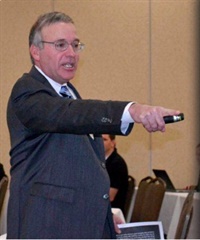Find Your Jurisdiction
To find jurisdictions offering this course for CLE credit, select from the highlighted states on this map.
Discovering Implicit Biases in Jury Selection
Total Credits: 1 including 1 Elimination of Bias in the Legal Industry
- Average Rating:
- 127
- Categories:
- Legal Ethics | Trial Practice | Elimination of Bias
- Faculty:
- Philip Bogdanoff, Esq. | Samantha D. Holmes, PhD
- Course Levels:
- Intermediate
- Duration:
- 1:00
- Format:
- Audio and Video
- License:
- Expires 60 day(s) after program date.
Description
Everyone has implicit biases that influence their judgment. However, when selecting a jury it is important for attorneys to uncover the implicit biases of prospective jurors to obtain a jury that can hear your client’s case fairly and impartially. Further, it is essential for attorneys to understand their own implicit biases and how they can influence your decisions when selecting a jury.
In this presentation, Samantha Holmes, a PhD in Social Psychology with two decades of experience helping attorneys pick juries, will discuss these implicit biases: why attorneys must understand their own when picking a jury and how to reveal a potential juror’s that may harm your client’s case. Using sexual assault cases as his example, Philip Bogdanoff, a career prosecutor, will discuss implicit biases and how attorneys can combat these biases to obtain a fair and impartial jury.
Handouts
| Gender Bias jury selection outline - Bogdanoff (103 KB) | 2 Pages | Available after Purchase |
| Jury selection bias speech takeaway points Holmes (256.6 KB) | 3 Pages | Available after Purchase |
Faculty
Philip Bogdanoff, Esq. Related Seminars and Products
Philip Bogdanoff is a nationally recognized continuing legal education speaker on the topics of ethics, professionalism, and other related topics. Previously, as an attorney, he served as assistant prosecutor in the Summit County, Ohio Prosecutor’s Office for more than 25 years, beginning in 1981. Mr. Bogdanoff argued cases before the Ohio Ninth District Court of Appeals and twenty cases before the Ohio Supreme Court including six death penalty cases - before retiring as a senior assistant prosecutor.
He is the author of numerous articles on ethics, professionalism and other related legal topics and has taught the members of numerous organizations including the National Association of Legal Administrators, as well as numerous state and local Bar associations, Prosecuting Attorney's Associations, and law firms. More information about Mr. Bogdanoff is available on his Web site at http://www.philipbogdanoff.com/.
Samantha D. Holmes, PhD Related Seminars and Products
Dr. Samantha (Sam) Holmes has worked in the field of jury psychology for 25 years. Sam earned her Ph.D. in Social Psychology from the University of Michigan and certification in data analytics using artificial intelligence and machine learning from Brown University. She has worked with clients on hundreds of different cases—including wrongful death/personal injury, insurance/bad faith, intellectual property, pharmaceutical, amusement/leisure industry, product liability, tobacco, corporate fraud, antitrust, contract disputes, employment, toxic tort, securities, and medical and professional malpractice. She has worked on cases in a wide variety of venues including those in Arkansas, California, Florida, Illinois, New Hampshire, New York, Pennsylvania, Tennessee, Texas, Vermont, West Virginia, and even Alaska. Sam has helped attorneys from around the country develop persuasive strategies for both trial and mediation. Sam’s training and experience have made her highly skilled at data collection and interpretation, statistical analysis, and juror profiling and have given her impeccable people skills. Sam has authored several published articles and served as a faculty lecturer at many law firms, as well as regional and national conferences including ones sponsored by the American Bar Association, the American College of Trial Lawyers, and the Defense Research Institute.
Sam and her partners often help clients understand and identify the strengths, vulnerabilities, risks, and opportunities of their cases by conducting pre-trial jury research. Additionally, she and her colleagues help lawyers prepare witnesses and develop strategies to make them more confident and persuasive communicators during deposition and at trial. Sam helps clients in court with jury selection and helps the trial team develop ongoing trial strategy through opening statement analysis, trial monitoring and shadow juries. She also assists lawyers in understanding how jurors evaluated actual cases through conducting post-trial interviews.
When Sam is not helping attorneys tackle high-profile cases, she enjoys traveling, Broadway musicals, spending time with her family and pets, and riding the world’s best roller coasters.
Dates
|
Wed, Feb 18, 2026 - 10:00 AM to 11:00 AM PST
|
Reviews
| 5 |
|
| 4 |
|
| 3 |
|
| 2 |
|
| 1 |
|





